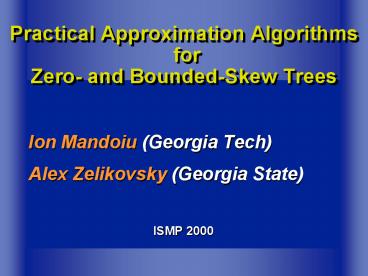Ion Mandoiu Georgia Tech - PowerPoint PPT Presentation
1 / 31
Title:
Ion Mandoiu Georgia Tech
Description:
Zero-Skew Tree: rooted tree in which all root-to-leaf paths have the same length ... lower-bound on optimum ZST length. Converting spanning tree to zero-skew ... – PowerPoint PPT presentation
Number of Views:48
Avg rating:3.0/5.0
Title: Ion Mandoiu Georgia Tech
1
Practical Approximation Algorithms forZero- and
Bounded-Skew Trees
- Ion Mandoiu (Georgia Tech)
- Alex Zelikovsky (Georgia State)
- ISMP 2000
2
Zero-Skew Trees
Zero-Skew Tree rooted tree in which all
root-to-leaf paths have the same length
Used in VLSI clock routing network multicasting
3
The Zero-Skew Tree Problem
Zero-Skew Tree Problem Given set of terminals in
rectilinear plane Find zero-skew tree with
minimum total length
- Previous results CKKRST 99
- NP-hard for general metric spaces
- factor 2e 5.44 approximation
- Our results
- factor 4 approximation for general metric spaces
- factor 3 approximation for rectilinear plane
4
Overview
- Constructive lower-bound on optimum ZST length
- Converting spanning tree to zero-skew trees
- Finding spanning trees with small conversion
cost - Improved conversion using Steiner points
- Approximation algorithms for bounded-skew trees
- Conclusions and open problems
5
ZST Lower-Bound
6
ZST Lower-Bound
(CKKRST 99)
N(r)min. of balls of radius r that cover all
sinks
7
ZST Lower-Bound
(CKKRST 99)
N(r)min. of balls of radius r that cover all
sinks
8
ZST Lower-Bound
(CKKRST 99)
N(r)min. of balls of radius r that cover all
sinks
9
ZST Lower-Bound
(CKKRST 99)
N(r)min. of balls of radius r that cover all
sinks
10
Constructive Lower-Bound
Computing N(r) is NP-hard, but
11
Constructive Lower-Bound
12
Stretching Rooted Spanning Trees
- ZST root spanning tree root
13
Stretching Rooted Spanning Trees
14
Stretching Rooted Spanning Trees
15
Zero-Skew Spanning Tree Problem
16
How good are the MST and Min-Star?
17
The Rooted-Kruskal Algorithm
- While ? 2 roots remain
18
The Rooted-Kruskal Algorithm
19
How good is Rooted-Kruskal?
Lemma delay(T) ? length(T)
20
How good is Rooted-Kruskal?
Lemma length(T) ? 2 OPT
21
Factor 4 Approximation
Algorithm Rooted-Kruskal Stretching
- Length after stretching length(T) delay(T)
- delay(T) ? length(T)
- length(T) ? 2 OPT
? ZST length ? 4 OPT
22
Stretching Using Steiner Points
23
Factor 3 Approximation
Algorithm Rooted-Kruskal Improved Stretching
- Length after stretching length(T) ½ delay(T)
- delay(T) ? length(T)
- length(T) ? 2 OPT
? ZST length ? 3 OPT
24
Practical Considerations
- For a fixed topology, minimum length ZST can be
found in linear time using the Deferred Merge
Embedding (DME) algorithm Eda91, BK92, CHH92 - Practical algo Rooted-Kruskal Stretching DME
Theorem Both stretching algorithms lead to the
same ZST topology when applied to the
Rooted-Kruskal tree
25
Running Time
- Stretching O(N logN)
- Rooted-Kruskal O(N logN) using the dynamic
closest-pair data structure of B98 - DME O(N) Eda91, BK92, CHH92
? O(N logN) overall
26
Extension to Other Metric Spaces
Everything works as in rectilinear plane, except
- No equivalent of DME known for other spaces
- The space must be metrically convex to apply
second stretching algorithm
27
Bounded-Skew Trees
b-bounded-skew tree difference between length of
any two root-to-leaf paths is at most b
Bounded-Skew Tree Problem given a set of
terminals and bound bgt0, find a b-bounded-skew
tree with minimum total length
- Previous approximation guarantees CKKRST 99
- factor 16.11 for arbitrary metrics
- factor 12.53 for rectilinear plane
Our results factor 14, resp. 9 approximation
28
BST construction idea lower bound
Two stage BST construction
- Cover terminals by disjoint b-bounded-skew trees
- Connect roots via a zero-skew tree
29
Constructing the tree cover
30
BST Approximation
Algorithm Output tree cover ? approximate ZST on
W
31
BST Approximation
32
Summary of Results
33
Open Problems
- Complexity of ZST problem in rectilinear plane
- Complexity of finding the spanning tree with
minimum lengthdelay? - Zero-skew Steiner ratio supremum, over all
sets of terminals, of the ratio between minimum
ZST length and minimum spanning tree lengthdelay - What is the ratio for rectilinear plane?
- What is the ratio for arbitrary spaces? ( ?4,
?3) - Planar ZST / BST































